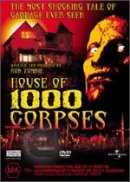
House of 1000 Corpses
See also:
Devil's Rejects, The (Noah K.)
With House of 1000 Corpses, metal guitarist Rob Zombie (of White Zombie) writes/directs his ode to slasher films, in particular, the B films of the 50s and 60s and the exploitation films of the 70s and 80s.
Surprisingly, 1000 Corpses brings something innovative in the way of style to the genre – and I'm happy to say it's neither state-of-the-art CG effects or postmodernism (although there are countless references to his favourite horror films in there, but they don't smack you in the face). Zombie combines the camera work and lighting of old horror films with MTV editing to make an interesting style that feels 'new' without feeling like a 'contemporary update'. The sets, costumes and make-up in every scene are also incredibly detailed and atmospheric, though oftentimes they are only glimpsed because the camera is too busy moving and zooming. Zombie also provides an awesome score that's reminiscent of the rock scores from Italian horror films of the 70s.
Where 1000 Corpses fails is where most films of the genre fail: the plot. In the tradition of Texas Chainsaw Massacre, the film is about a group of teenagers who stumble upon a family of psychopaths. Unlike Texas Chainsaw Massacre, there is just too much of the family in there – the family eating dinner unusually, the family watching TV unusually, etc. – and it all just becomes so boring after a while. Crazy killers need something to do throughout a film, whether it be something to strive for (like in Se7en) or the need to escape being caught. If they don't, then they shouldn't be the focus of the film – it should be about the teenagers or the cops tracking them down or something, anything. Otherwise it becomes paceless and gratuitous. Granted, the genre by definition is meant to be gratuitous, but it's also not meant to be boring.
I could bring all this up with Rob, but I doubt it would matter much to him. In terms of what he wanted to accomplish with 1000 Corpses – a little film for himself that celebrates his favourite genre – he was successful.
But that's not why films have audiences.